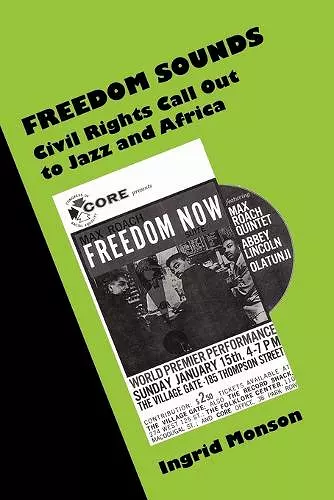Freedom Sounds
Civil Rights Call out to Jazz and Africa
Format:Paperback
Publisher:Oxford University Press Inc
Published:25th Nov '10
Currently unavailable, currently targeted to be due back around 19th September 2025, but could change
This paperback is available in another edition too:
- Hardback£145.00(9780195128253)

An insightful examination of the impact of the Civil Rights Movement and African Independence on jazz in the 1950s and 60s, Freedom Sounds traces the complex relationships among music, politics, aesthetics, and activism through the lens of the hot button racial and economic issues of the time. Ingrid Monson illustrates how the contentious and soul-searching debates in the Civil Rights, African Independence, and Black Power movements shaped aesthetic debates and exerted a moral pressure on musicians to take action. Throughout, her arguments show how jazz musicians' quest for self-determination as artists and human beings also led to fascinating and far reaching musical explorations and a lasting ethos of social critique and transcendence. Across a broad body of issues of cultural and political relevance, Freedom Sounds considers the discursive, structural, and practical aspects of life in the jazz world in the 1950s and 1960s. In domestic politics, Monson explores the desegregation of the American Federation of Musicians, the politics of playing to segregated performance venues in the 1950s, the participation of jazz musicians in benefit concerts, and strategies of economic empowerment. Issues of transatlantic importance such as the effects of anti-colonialism and African nationalism on the politics and aesthetics of the music are also examined, from Paul Robeson's interest in Africa, to the State Department jazz tours, to the interaction of jazz musicians such Art Blakey and Randy Weston with African and African diasporic aesthetics. Monson deftly explores musicians' aesthetic agency in synthesizing influential forms of musical expression from a multiplicity of stylistic and cultural influences--African American music, popular song, classical music, African diasporic aesthetics, and other world musics--through examples from cool jazz, hard bop, modal jazz, and the avant-garde. By considering the differences between aesthetic and socio-economic mobility, she presents a fresh interpretation of debates over cultural ownership, racism, reverse racism, and authenticity. Freedom Sounds will be avidly read by students and academics in musicology, ethnomusicology, anthropology, popular music, African American Studies, and African diasporic studies, as well as fans of jazz, hip hop, and African American music.
Ingrid Monson is one of the pre-eminent scholars of modern `usic, American history, and African American culture. In this book she puts forward a theoretically sophisticated, historically nuanced, and politically courageous analysis of how jazz was recast and remade on the treacherous terrain of postwar America (1950-1967). This book is cultural criticism at its best! * Cornel West, University Professor, Princeton University *
In this brilliant, polyphonic rendering of the relationship of jazz to the civil rights movement, Monson offers a compelling account of the interplay of music, race, and aesthetic modernism in American history. The music itself is never tangential to her story; on the contrary, we see how it came to embody the very ethos of the struggle and the presumptions that nurtured it. Monson insists that jazz exemplifies the faith that inspired performance can break beyond existing artistic and social constraints, that it offers a vision of history relevant way beyond its time and place. The same might be said of this extraordinary book. * Jean Comaroff, Bernard E. and Ellen C. Sunny Distinguished Service Professor, University of Chicago *
ISBN: 9780199757091
Dimensions: 152mm x 229mm x 24mm
Weight: 608g
416 pages